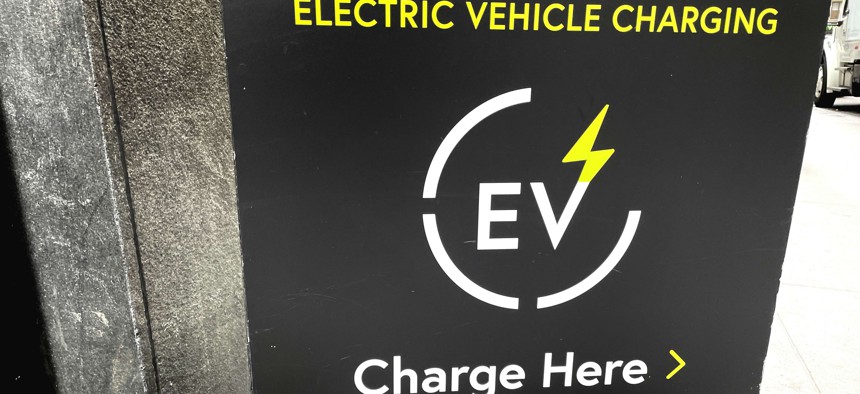Biden administration announces $623 million in EV charging grants for state and local agencies

Deb Cohn-Orbach/UCG/Universal Images Group via Getty Images

Connecting state and local government leaders
The grants, which come as part of the 2021 infrastructure law, are intended to ensure chargers are built in underserved or remote communities.
California, New Mexico, Puerto Rico and Texas emerged as some of the biggest winners in the first round of federal grants designed to help communities install chargers for electric and other alternative fuel vehicles.
They were among the 23 states and territories that secured funding from the Biden administration Thursday. The Federal Highway Administration, or FHWA, announced $623 million in awards for 47 projects. They varied in scope from half a million dollars to install four EV chargers on the San Carlos Apache Reservation in Arizona to $70 million to build five hydrogen fueling centers for medium and heavy trucks in the “Texas Triangle” of Dallas-Fort Worth, Houston, Austin and San Antonio.
All told, the grants announced this week will pay for 7,500 new charging ports across the country, according to the administration.
The Charging and Fueling Infrastructure grants come as part of the 2021 infrastructure law, which specifies that half of them must go toward providing connections in underserved communities and the other half must help develop alternative fuel corridors.
“EV drivers charge where they park, which is very convenient if you have a single family home with a garage or you work in an office that supports easily your ability to plug in,” Transportation Secretary Pete Buttigieg said in a call with reporters. “But if you live in an apartment or you work in a rural area with fewer charging stations or if you are routinely driving over longer distances, it’s not that easy.”
“That’s one of the reasons why these grants focus on urban and rural communities, where we don’t believe that it would be quick and automatic for this charging infrastructure to emerge without this kind of [funding],” he explained.
In California, a pollution agency in the San Joaquin Valley received $56 million to build two truck charging sites along Interstate 5. The sites will also include 90 fast chargers for passenger vehicles, 85 fast chargers for medium and heavy duty vehicles, and 63 acres of solar panels.
Puerto Rico garnered more than $51 million to install chargers along a 205-mile roadway through the island. The 10 locations will all be within 30 miles of each other and within one mile of a highway exit.
New Mexico’s transportation department received nearly $64 million to install electric ports for trucks along Interstate 10, which will be part of the country’s first network of high-powered chargers for big trucks that will stretch from the San Pedro ports in the Los Angeles area to El Paso, Texas.
Other recipients include the Chilkoot Indian Association, an Alaska Native Tribe, to build the first EV chargers in the rural town of Haines; the city of Mesa, Arizona, which plans to install chargers for vehicles, e-bikes and scooters; and the New Jersey Department of Environmental Protection to build stations for multifamily housing in disadvantaged communities, rural areas and near transit stops.
The 2021 infrastructure law provides a total of $2.5 billion for the Charging and Fueling Infrastructure grants, which state agencies, local governments and tribal governments can apply for. That comes on top of a separate $5 billion automatically distributed to state transportation departments to build chargers along major interstate corridors.
The Biden administration wants to increase the number of publicly available chargers to 500,000 by 2030. At the end of 2023, there were 170,000 public chargers, White House National Climate Advisor Ali Zaidi told reporters.
Of course, the numbers don’t include chargers people have in their homes, many of which could fit into a standard outlet. But the count does include several chargers that aren’t compatible with some vehicles, such as Level 2 ports or “fast chargers.” Most vehicles can only use certain kinds of chargers, although the federal government has helped standardize the infrastructure, and many automakers plan to adopt Tesla-style plugs for their future cars and light trucks.
The federal government’s efforts are meant to build chargers where private companies are unlikely to do so, such as long stretches of rural highway with few towns or lower-income areas in urban areas.
The program has been slow to get underway. It took two years for the first federally funded chargers to be installed in Ohio. And roughly half the states have not yet accepted bids to install chargers. Recently, Maine, New York and Pennsylvania have put in their own charging stations or announced plans to do so soon.
The Biden administration has blamed delays on the need to draft rules about the types of chargers states can buy and where they must be built. An administration official said Congress specifically wrote the programs so that the money would go to where it was most needed, but that required time. The official expected “hundreds, if not thousands” of federally funded chargers to be installed this year.
But the long delays have inspired some House Republicans to try to revoke the funding for the grants. So far, those efforts have been unsuccessful.
Daniel C. Vock is a senior reporter for Route Fifty based in Washington, D.C.

NEXT STORY: Local transit agencies mimicking Uber and Lyft are seeing big ridership gains





